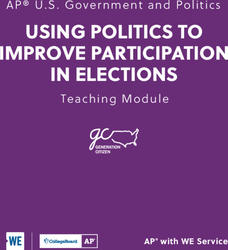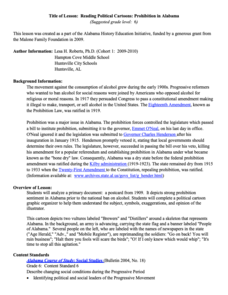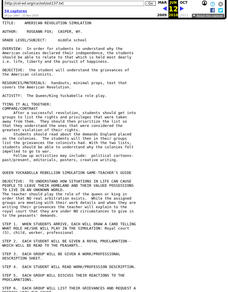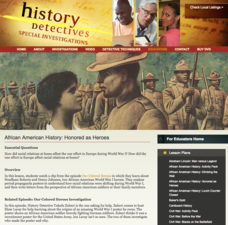Curated OER
Social Movements in American Politics
In this term paper assignment worksheet, students follow the provided steps and outline that requires them to research and write a paper about social movements in American politics.
Curated OER
Social Movements in American Politics
In this Civil Rights Movement worksheet, students follow the provided instructions to write term papers on the social movement and how it was impacted by American politics.
C-SPAN
Why Do Americans Not Vote in Elections?
In an age of inflamed politics, who votes, who doesn't vote, and why are the questions everyone is trying to answer. Pupils listen to scholars, journalists and data crunchers on voting statistics to make their own conclusions. A chart...
North Carolina Consortium for Middle East Studies
Missing Pieces of the Puzzle: African Americans in Revolutionary Times
What's missing from most studies of the American Revolutionary War is information about the role African Americans played in the conflict. To correct this oversight, middle schoolers research groups like the Black Loyalists and Black...
College Board
Using Politics to Improve Participation in Elections
Instructors new to teaching AP U.S. Government and Politics classes, as well as seasoned veterans, will find this teaching guide an invaluable resource. Using a project-based approach to civics education, the lessons emphasize real-world...
Digital Public Library of America
Ida B. Wells and Anti-Lynching Activism
A packet of 13 primary sources provides young historians with insight into the anti-lynching activism of civil rights Ida B. Wells. Included are images of Wells, her letters, a political cartoon, newspaper lynching announcements, and a...
National Endowment for the Humanities
African-American Communities in the North Before the Civil War
Middle schoolers may be surprised to learn that before the American Civil War there were more slaves living in New York than there were in Kentucky! Young historians examine maps and census data to gather statistics about...
K20 Learn
American Exclusivity: The Chinese Exclusion Act
The Chinese Exclusion Act—the first race-based immigration restriction—is echoed in today's debates on the topic. Using graphic organizers and structured discussions, historians consider the reasons behind the act and compare the...
Carolina K-12
African Americans in the United States Congress During Reconstruction
The Civil Rights Act of 1866, which granted citizenship to all males in the U.S., resulted in the first African Americans to be elected to Congress. Class members research 11 of these men, the challenges they faced, and craft...
Alabama Department of Archives and History
Reading Political Cartoons: Prohibition in Alabama
What makes a cartoon political? The lesson plan provides learners with political cartoons and teaches how to analyze them using a five-step process. Scholars also complete a hands-on activity and participate in group discussions to...
Core Knowledge Foundation
Isn’t It Exciting? (The American Industrial Revolution and Urbanization)
America was built on the ingenuity, work ethic, and foresight of our ancestors. Sixth graders learn about the complex Gilded Age in American history, including the prominent inventors and captains of industry, and how they all connect...
PBS
The Roosevelts: An Intimate History—Snapshot Lessons
The Roosevelt family was one of the most influential and prominent political forces in the 20th century, leaving behind a wide-ranging legacy of conservation, progressivism, and economic growth. Learn more about President Theodore...
Curated OER
The 44th and 45th USA Presidents
The transition of power between former President Barack Obama and President Donald Trump may be the first political process that your students have followed. Fill out the details between these two leaders with a set of vocabulary...
Humanities Texas
Primary Source Worksheet: Lyndon B. Johnson, Excerpt from “The American Promise”
"I want to be the president who educated young people to the wonders of their world." Readers examine the vision Lyndon B. Johnson presented for his presidency in this excerpt from his "The American promise" message delivered to Congress...
US House of Representatives
Permanent Interests: The Expansion, Organization, and Rising Influence of African Americans in Congress, 1971–2007
The fourth installment of the seven-instructional activity unit focused on African Americans elected to and serving in the US Congress looks at the period from 1971 through 2007. Class members read a contextual essay that provides...
Eastconn
Learning to Analyze Political Cartoons with Lincoln as a Case Study
Discover the five main elements political cartoonists use—symbolism, captioning and labels, analogy, irony, and exaggeration—to convey their point of view.
Curated OER
American Revolution Simulation: Colonial History, Drama
Learners explain why the American colonies declared the independence, students should relate to that which is held most dearly i.e. life, liberty and the pursuit of happiness. They participate in a drama that illustrates this.
National Endowment for the Humanities
The Argument of the Declaration of Independence
When in the course of a course on historic American events, it becomes necessary for learners to examine, with decent respect, the Declaration of Independence, it becomes evident that there are six separate and equal parts of that...
Museum of the American Revolution
Image Analysis: In Their Own Words
Images often convey more than words. Scholars examine political cartoons from the American Revolution to understand how images have the ability to express political ideas. Academics participate in group discussion, complete a worksheet,...
HISTORY Channel
The American Presidency Grades 7-9
As part of a study of the American Presidency, groups investigate five topics: Campaigns and Elections, Role and Responsibilities, Life in the White House, Assassination and Mourning, and Communicating the Presidency.
Constitutional Rights Foundation
The Troubled Elections of 1796 and 1800
Congress does more than create new laws. Political scientists delve into the elections of 1796 and 1800 to understand how political parties, the Electoral College, and personal agendas affected the election process. The resource also...
Smithsonian Institution
Us vs. Them: The Chinese Exclusion Act of 1882
Immigration issues are nothing new. An interesting lesson focuses on the racially motivated Chinese Exclusion Act of 1882 and its impact on the Chinese American community. Scholars read articles, analyze political cartoons, and...
Pace University
Jacksonian Democracy
Jacksonian Democracy ... a total success or a complete failure? Young academics examine Jacksonian Democracy, including the concept of the supremacy of the federal government and the forced relocation of Native Americans. Scholars...
PBS
African American History: Honored as Heroes
To gain an understanding of the treatment of African American soldiers during World War I, class members watch an excerpt from the History Detectives film, Our Colored Heroes, and then examine three recruitment posters from that time...

























